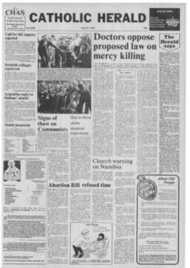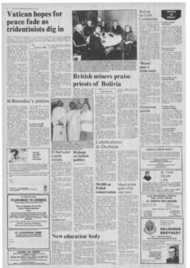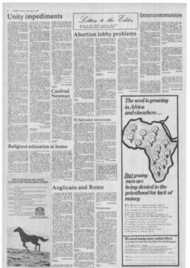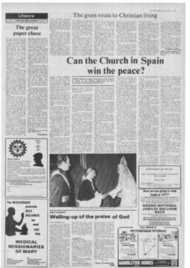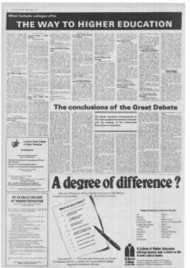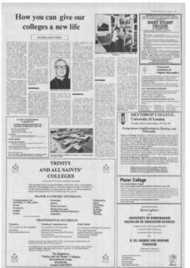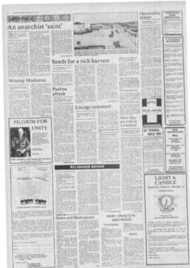Page 5, 27th May 1977
Page 5
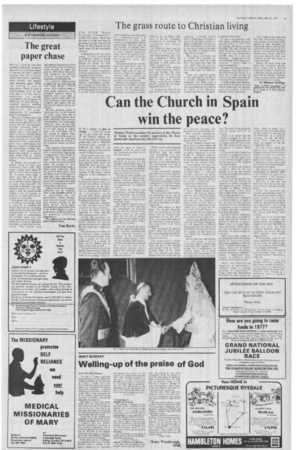
Report an error
Noticed an error on this page?If you've noticed an error in this article please click here to report it.
Tags
Share
Related articles
Spain And Kennedy
Political Left And Right In Spanish Church
En Lish Red Monopoly Of Propaganda Bro En For First
Bilbao Bishop Wins Fight To Stay
Catholics And The War
Can the Church in Spain
win the peace?
IT IS a matter of plus ca change . . Just two years ago, in the tense last weeks of the Franco regime, officials banned two Christian gatherings, one in Madrid's working-class suburb of Vallecas, the other in Las Palmas, capital of the tourist island of Gran Canaria.
Ecclesiastical reactions were forceful. One might have expected the civil authorities to have learned their lesson, but apparently they haven't. Last October 30 to November 1 there was to have been a meeting of 200 people, mainly religious, in the monastery of Poio.
The theme was the attitude of Christians in Calicia when faced with the political problems of the province. In the afternoon of October 29 the gathering was prohibited by order of the civil governor, on the grounds that illegal political groups were going to exploit the meeting for their own ends.
Church authorities complained that the ban was a contravention of the Concordat — a treaty of which they disapproved, of course, hut used when advantageous to do so.
Maybe the governor was acting ultra vires. One may also doubt whether his actions pleased his superiors in Madrid. But his confusion is understandable.
The enormous turn-about in the Church's stance in Spain since the Vatican Council is not only a puzzle to the civil authorities. It is a puzzle to many of the faithful and to some of the clergy as well.
The fundamental laws of the Spanish State are not so much a Constitution, more the embodiment of an ideology. They ex
press the spirit of Franco's cruzada, which he could, and did, represent as a holy war to save the Church.
And the Church was suitably grateful. A prayer for the Caudillo followed the Collect of the Day at every Mass. Bishops sat in the Spanish parliament, and on various councils of state. Spain was Catholic by law.
The details were spelled out in a Concordat in 1953. Its bestknown provision allowed the Spanish government final say in the appointment of residential bishops.
In return, the Church was guaranteed a limited immunity Irom censorship, and its priests from arrest. There was (meagre) financial help for the parochial clergy.
The Vatican Council was a shock to the system, especially the documents on religious liberty and the Church in the modern world. It was quite clear that the Church outside Spain was not in sympathy with the Right-wing regime which governed the country.
And the Church in Spain could no longer be relied upon either. Nuncios in Madrid had been working towards a renewal of the hierarchy. Catholic action groups, entering into dialogue with workers, had been forced into a political shift towards the Left. Educational reforms, which meant that teaching religious ,had to earn civil degrees, widened horizons. When a survey of the Spanish clergy was mounted in November, 1966, the results were astonishing. The four stout volumes of conclusions showed that nearly threequarters of the respondents to the questionnaire were out of sympathy with the terms of the Concordat.
A high proportion regarded themselves as socialist, and few wanted a return to traditional monarchical government. While there was a high level of commitment to Church reform, only 50 per cent felt themselves able to explain the changes to their congregations.
The same proportion believed themselves to be out of touch with the modern world, and incapable of dealing with the pastoral problems to which it gave rise.
With such details to help them, the Spanish hierarchy and representatives of the clergy met in Madrid. from September 13 to 20, 1971. Within five weeks 800 pages of the assembly's working papers and decisions had been published.
They laid down the plan of reform within the Church, and the social and political action to be taken, which has been followed ever since.
The programme's major achievement was the abandonment last July of the Spanish government's right to "name" bishops. Many of the empty Sees have already been filled. though only two of the new ap pointments please the progressive wing of the Church.
Five separate commissions are engaged in intense discussion to rejig the remaining articles of the Concordat.
At the moment it seems that there will be massive State aid to religious schools (almost all of the primary, and much of the secondary education is in the hands of religious orders, hitherto ludicrously penalised by an education ministry which could not do without them).
From January this year the State will pay parochial clergy 15,4(X) pis (c1140) a month out of public funds — a decision already rejected by many priests who see it as a backward step on the Church's journey towards complete independence of the State.
Not surprisingly there are accusations that the government of Senor Adolfo Suarez has "bought" the Church. Shortly after he took office, Sr Suarez 'had interviews with leading members of the hierarchy. There seems to have been a lessening of opposition to the regime since, at least on the part of the "official" Church.
Faced with this new situation the hierarchy is not wholly united. Indeed. it never has been.
The Primate himself was un• easy the way thiugs were going, and the opposition of Bishop Guerra Campos of Cuenca was unswerving. He was one of only 58 members of the Cortes to vote against the constitutional reforms.
But at least while the Church was confronting a clearly oppressive regime, the bishops could base their appeal to the people on a commitment to human rights. In a more pluralist society that stance will no longer be so easy to main
tam. The unity of the hierarchy will be more difficult to achieve.
There is no doubt that the Church managed to win the respect of many Spaniards who no longer practised their faith. But that respect rarely led to a resumption of weekly Massgoing. It may be that the Church has so spent its energies in its confrontation with the regime that it has not had enough to spare for the renewal of the religious life of the people.
And it is faced with massive problems. Only in the last decade or so has the country become an urban, rather than a rural, community.
The Church has not yet come to terms with the drift to the large towns, and in particular to the north-east corner of Spain, bounded by Bilbao, Valencia and Barcelona, where more than a third of the country's entire population now lives. The Church has impressive machinery which is, or ought to be, the envy of many another hierarchy for the identification of problems. It has less success in dealing with them, once they have been identified.
Just like Catholics elsewhere in the world, there are those in Spain who find the reforms of Vatican II difficult to accept. There exists a strong Rightwing movement which, given the close ties between Church and State, has obvious political overtones.
There have been visions in Garabandal in the North, and at Palmar tie Troya in the South. The group gathered around the "seer" Clemente Dominguez in Palmar, which, with its illicitly ordained bishops and priests, amounts almost to a schismatic Church, is particularly reactionary in tendency, both politically and ecclesiastically.
There are Right-wing magazines of extraordinary virulence. There is a strong grouping of "traditionalist" clergy called the Hermandad Sacerdotal de San Antonio de Claret. Only in Spain has a group of Jesuits felt themselves strong enough to demand the establishment of a separate province "of the old observance." For a while they enjoyed the support of the late Cardinal DaniClou.
On the other hand the Church has been powerful enough a force in the country's politics to attract to its service some outstanding leaders. The head el the Justice and Peace Commission is a man who might one day become Prime Minister in a democratic Spain..
The Church will have to turn increasingly to pastoral tasks. I.ike Churches in every European country, it will find itself ill-equipped to deal with them.
The war, as they say, has been won. It remains to be seen if the Church can also win the peace.
Under his direction the Church spear-headed many of the movements towards greater social justice. It is often forgotten, for example, that the amnesty, the granting of which was regarded as a test of King Juan Carlos's seriousness of purpose, began as a proposal by the Justice and Peace Commission.
The unity of the Church has never been complete, and always fragile. As a bishop ad-, mitted to inc after the Vallecas affair last year, the good relations between clergy and hierarchy, so obvious after .the 1971 assembly, were rapidly deteriorating.
Without. quite such an obvious opponent to fight against. or such clear-cut rights to fight for, one suspects that the unity will collapse still further.
The public role of the Church will inevitably lessen, once a "pluralist society" has been established.
The Church in the last decade resisted all attempts of the Franco regime to restrict it to the sacristy. It is paradoxical that this may be the result olthe Church's own success as a reforming Force in Spanish .society.
blog comments powered by Disqus


